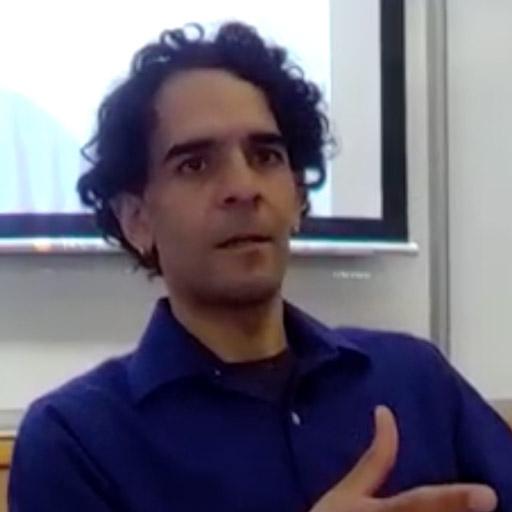
Nabeel Hamid
Thesis supervisor Accepting inquiries
- Associate Professor, Philosophy
Are you the profile owner?
Sign in to editThesis supervision details
Supervised program: Philosophy (MA)
Research areas: Early Modern Philosophy; Kant; Dilthey; History and Philosophy of Science; Philosophy of Religion; Islamic Philosophy
Contact information
Biography
Research interests
I have broad interests in the history of philosophy. My primary research focus is German philosophy from the seventeenth to the nineteenth centuries. My main project deals with the reception of Descartes in seventeenth- and early-eighteenth century German universities--a phenomenon sometimes called 'Cartesian Scholasticism.' The project traces developments in method and metaphysics in the German scholastic tradition from Johann Clauberg (1622-65) to Christian Wolff (1679-1754). I also write on Kant, often with an eye to his German scholastic background, and especially on the themes of causation and teleology.
I also work on nineteenth-century German philosophy, especially on Wilhelm Dilthey's (1833-1911) account of historical science--its psychological foundations, its relation to natural scientific explanation, and its critical and empiricist underpinnings. This project aims to situate Dilthey's 'critique of historical reason' in the context of a) the emergence of new empirical sciences of human nature in nineteenth-century Germany, such as anthropology, sociology, and psychology; and b) contemporaneous currents in German philosophy to interpret the new scientific situation, such as positivism, idealism, materialism, and neo-Kantianism.
I have interests in medieval philosophy (Latin and Arabic). I am particularly interested in theories of causation in figures such as Avicenna, Averroes, Buridan, and Suarez, and the transformation of the Aristotelian causal framework in this tradition.
Education
PhD (Philosophy), University of Pennsylvania, 2018
MA (Philosophy), University of British Columbia, 2012
MA (Applied Linguistics), Macquarie University, 2010
BA (Philosophy), University of Wisconsin-Madison, 2004
Publications
Journal articles and book chapters
2024. "Wolff on Substance, Power, and Force." Journal of the History of Philosophy 62, no. 4: 615-638.
2024. "Causalité divine et causalité seconde selon Clauberg." Les Études philosophiques no. 3/2024: 17-42.
2023. "Anthropology and History in the Early Dilthey." Studies in History and Philosophy of Science 100: 90-98.
2023. "The Cartesian Physiology of Johann Jakob Waldschmidt." In Descartes and Medicine, edited by Fabrizio Baldassarri, 393-409 (Turnhout: Brepols).
2023. "Physicotheology in Kant's Transition from Nature to Freedom." Kantian Review 28, no. 2: 201-219.
2022. "Reason in Kant's Theory of Cognition." Canadian Journal of Philosophy 52, no. 6: 636-653
2022. "Substance, Causation, and the Mind-Body Problem in Johann Clauberg." Oxford Studies in Early Modern Philosophy 11: 31-66.
2021. "Efficient Cause as Paradigm? From Suárez to Clauberg." Journal of Modern Philosophy 3, no. 7: 1-22
2021. "Law and Structure in Dilthey's Philosophy of History." British Journal for the History of Philosophy 29, no. 4: 633-651.
2020. "Domesticating Descartes, Renovating Scholasticism: Johann Clauberg and the German Reception of Cartesianism." In "Natural Philosophy in the Early Modern Academic Milieu," edited by Mordechai Feingold and Andrea Sangiacomo. Special issue: History of Universities 30, no. 2: 57-84.
2019. "Wolff's Science of Teleology and Kant's Critique." Ergo 6, no. 17: 489-515.
2019. "Teleology and Realism in Leibniz's Philosophy of Science." In Leibniz and the Structure of Sciences, edited by Vincenzo de Risi, 271-298 (Berlin: Springer).
2018. "Kant's Antinomy of Teleology: In Defense of a Traditional Interpretation." In Proceedings of the 12th International Kant Congress, edited by Violetta Waibel and Margit Ruffing, 1641-1648 (Berlin: de Gruyter).
2016. "Dilthey on the Unity of Science." British Journal for the History of Philosophy 24, no. 4: 635-656.
2015. "Hume's (Berkeleyan) Language of Representation." Hume Studies 41, no. 2: 171-200.
Encyclopedia entries
2024. "Johannes Clauberg." In Stanford Encyclopedia of Philosophy.
Book reviews
2024. Jeffrey K. McDonough, A Miracle Creed: The Principle of Optimality in Leibniz's Physics and Philosophy. HOPOS: The Journal of the International Society for the History of Philosophy of Science.
2023. Frederick Beiser, Johann Friedrich Herbart. Review of Metaphysics 76, no. 3: 543-545.
2022. Ido Geiger, Kant and the Claims of the Empirical World. Kantian Review 28, no. 1: 157-161
2022. Brandon Look (ed.), Leibniz and Kant. The Leibniz Review 31: 141-145.
2022. Andrew Platt, One True Cause: Causal Powers, Divine Concurrence, and the Seventeenth-Century Revival of Occasionalism. Journal of the History of Philosophy 60, no. 2: 345-347.
2020. Eric Nelson (ed.), Interpreting Dilthey. British Journal for the History of Philosophy 28, no. 4: 853-855.
2018. Tal Glezer, Kant on Reality, Cause, and Force. The Leibniz Review 28: 119-122.
Research activities
Teaching activities
Regularly taught courses:
PHIL 281: Philosophy in the Islamic World
PHIL 360: 17th-Century Philosophy
PHIL 361: 18th-Century Philosophy
PHIL 4xx/6xx (upper undergrad/grad seminars): recent topics have included Kant's Critique of Pure Reason; Kant's Critique of the Power of Judgment; Teleology in Early Modern Philosophy; Kant and 18th-century German Philosophy; Leibniz.


